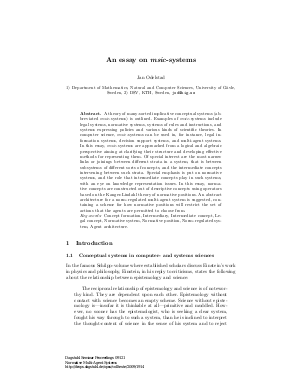An essay on msic-systems
Author Jan Odelstad
-
Part of:
Volume:
Dagstuhl Seminar Proceedings, Volume 9121
Part of: Series: Dagstuhl Seminar Proceedings (DagSemProc) - License:
 Creative Commons Attribution 4.0 International license
Creative Commons Attribution 4.0 International license
- Publication Date: 2009-03-11
File

PDF
DagSemProc.09121.10.pdf
- Filesize: 317 kB
- 39 pages
Document Identifiers
Subject Classification
Keywords
- Concept formation
- Intermediary
- Intermediate concept
- Legal concept
- Normative system
- Normative position
- Norm-regulated system
- Agent architecture.
Metrics
- Access Statistics
-
Total Accesses (updated on a weekly basis)
0Document
0Metadata
Abstract
A theory of many-sorted implicative conceptual systems (abbreviated msic-systems) is outlined. Examples of msic-systems include legal systems, normative systems, systems of rules and instructions, and systems expressing policies and various kinds of scientific theories. In computer science, msic-systems can be used in, for instance, legal information systems, decision support systems, and multi-agent systems. In this essay, msic-systems are approached from a logical and algebraic perspective aiming at clarifying their structure and developing effective methods for representing them. Of special interest are the most narrow links or joinings between different strata in a system, that is between subsystems of different sorts of concepts, and the intermediate concepts intervening between such strata. Special emphasis is put on normative systems, and the role that intermediate concepts play in such systems, with an eye on knowledge representation issues. In this essay, normative concepts are constructed out of descriptive concepts using operators based on the Kanger-Lindahl theory of normative positions. An abstract architecture for a norm-regulated multi-agent system is suggested, containing a scheme for how normative positions will restrict the set of actions that the agents are permitted to choose from.
Cite As Get BibTex
Jan Odelstad. An essay on msic-systems. In Normative Multi-Agent Systems. Dagstuhl Seminar Proceedings, Volume 9121, pp. 1-39, Schloss Dagstuhl – Leibniz-Zentrum für Informatik (2009)
https://doi.org/10.4230/DagSemProc.09121.10
BibTex
@InProceedings{odelstad:DagSemProc.09121.10,
author = {Odelstad, Jan},
title = {{An essay on msic-systems}},
booktitle = {Normative Multi-Agent Systems},
pages = {1--39},
series = {Dagstuhl Seminar Proceedings (DagSemProc)},
ISSN = {1862-4405},
year = {2009},
volume = {9121},
editor = {Guido Boella and Pablo Noriega and Gabriella Pigozzi and Harko Verhagen},
publisher = {Schloss Dagstuhl -- Leibniz-Zentrum f{\"u}r Informatik},
address = {Dagstuhl, Germany},
URL = {https://drops.dagstuhl.de/entities/document/10.4230/DagSemProc.09121.10},
URN = {urn:nbn:de:0030-drops-19146},
doi = {10.4230/DagSemProc.09121.10},
annote = {Keywords: Concept formation, Intermediary, Intermediate concept, Legal concept, Normative system, Normative position, Norm-regulated system, Agent architecture.}
}
